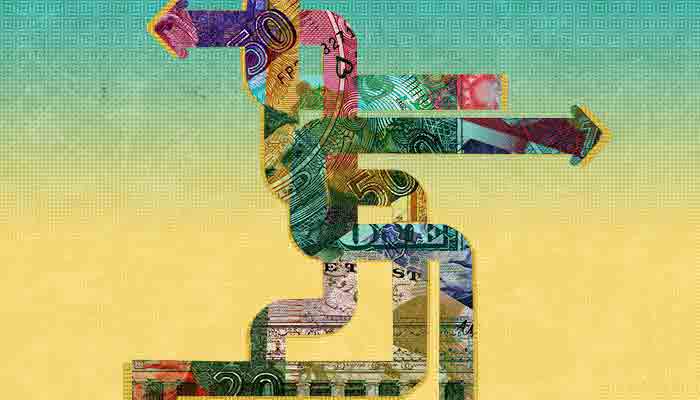Mini budget to stabilise economic growth: analysts
Most analysts don’t see the measures announced in the mini budget to spark inflation expectations
KARACHI: The government’s fiscal measures, rolled out in the Finance Supplementary Bill, 2021, would stabilise economic growth, analysts viewed on Thursday, saying that the impact of the drive would hardly increase already runway inflation.
“The removal of sales tax concessions on imported and local items and an increase in the federal excise duty on the imported and local vehicles are expected to increase public revenue by R343 billion,” an analyst at Alfalah Securities said.
He said the supplementary bill would tighten fiscal policy including withdrawal of tax deductions on raw material and some sectors and a cut in development spending.
“The bill has targeted the undocumented sector primarily through imposing taxes on import stage since the new taxes are adjustable against sales tax and/or income tax payable,” said an analyst at Alfalah Securities in a report.
The government tabled the IMF-backed bill to get a positive review revive of a stalled $6 billion funding programme launched in 2019.
The fund demanded further fiscal measures as part of a broader structural reforms package covering areas from the power sector debt to corporate governance, climate change and trade policy.
Most analysts don’t see the measures announced in the mini budget to spark inflation expectations.
“This would not materially impact inflation basket as most of these measures do not directly impact those items,” said Fahad Rauf, the head of research at Ismail Iqbal Securities.
“So CPI (consumer price index) would not be impacted much. But it would reduce the purchasing power of middle class buying a new car (over 850cc), infant food, pharma products, solar panels, mobile phones, etc.”
Rauf said discouraging imported cars and other products would reduce some pressure on import bill “but most of our exports come from essentials, which depend upon global commodity prices, so don't expect a major impact”.
“Not taxing fertilizers was a good decision, which would have impacted farmers, who are already facing shortages and higher prices.”
By announcing a supplementary budget, the government wants to bring more people into the tax net especially the higher class which affords high taxes.
Tahir Abbas, head of research at Arif Habib Limited said the taxation measures such as restoration of GST on imported and luxury items announced by the government would not hurt the lower classes as imported packaged products are not usually used by the common people.
“We anticipate the inflation to be clocked in at 12 percent in December and at 13-13.5 percent in January,” Abbas said.
As consumer price inflation has accelerated into double digits, with staples like flour, sugar, oil and rice doubling in price over recent months, the rupee has fallen around over 15 percent since May.
-
 Anti-monarchy Group Reacts To Prince William, Kate Middleton Statement On Epstein Scandal
Anti-monarchy Group Reacts To Prince William, Kate Middleton Statement On Epstein Scandal -
 Andrew 'must' Apologize Not Wider Royal Family For Jeffrey Epstein Links
Andrew 'must' Apologize Not Wider Royal Family For Jeffrey Epstein Links -
 Super Bowl 2026: Why Didn't Epstein Survivors Ad Air On TV?
Super Bowl 2026: Why Didn't Epstein Survivors Ad Air On TV? -
 'Harry Potter' TV Series Exec Teases 'biggest Event In Streaming': Deets
'Harry Potter' TV Series Exec Teases 'biggest Event In Streaming': Deets -
 Camila Mendes Finally Reveals Wedding Plans With Fiancé Rudy Mancuso
Camila Mendes Finally Reveals Wedding Plans With Fiancé Rudy Mancuso -
 Beatrice, Eugenie Blindsided By Extent Of Sarah Ferguson’s Epstein Links
Beatrice, Eugenie Blindsided By Extent Of Sarah Ferguson’s Epstein Links -
 Girl And Grandfather Attacked In Knife Assault Outside Los Angeles Home
Girl And Grandfather Attacked In Knife Assault Outside Los Angeles Home -
 Super Bowl Halftime Show 2026: What Did Trump Say About Bad Bunny?
Super Bowl Halftime Show 2026: What Did Trump Say About Bad Bunny? -
 Piers Morgan Defends Bad Bunny's Super Bowl Performance, Disagrees With Trump Remarks
Piers Morgan Defends Bad Bunny's Super Bowl Performance, Disagrees With Trump Remarks -
 Andrew Lands In New Trouble Days After Royal Lodge Eviction
Andrew Lands In New Trouble Days After Royal Lodge Eviction -
 Instagram, YouTube Addiction Case Trial Kicks Off In California
Instagram, YouTube Addiction Case Trial Kicks Off In California -
 Agentic Engineering: Next Big AI Trend After Vibe Coding In 2026
Agentic Engineering: Next Big AI Trend After Vibe Coding In 2026 -
 Keke Palmer Makes Jaw-dropping Confession About 'The Burbs'
Keke Palmer Makes Jaw-dropping Confession About 'The Burbs' -
 Cher Sparks Major Health Concerns As She Pushes Herself To Limit At 79
Cher Sparks Major Health Concerns As She Pushes Herself To Limit At 79 -
 Former NYPD Detective Says Nancy Guthrie's Disappearance 'could Be Hoax'
Former NYPD Detective Says Nancy Guthrie's Disappearance 'could Be Hoax' -
 King Charles Publicly Asked If He Knew About Andrew's Connection To Epstein
King Charles Publicly Asked If He Knew About Andrew's Connection To Epstein




